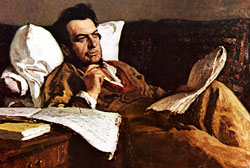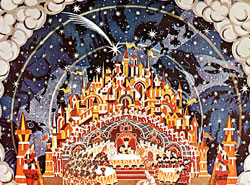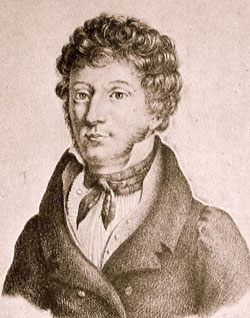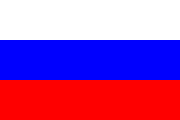|
|
|
 M.I.Glinka in a picture by I.E.Repin
 Sketch of the opera "Ruslan and Lyudmila" by B.Bilinksy
A reason for the inclusion of his folk-like melodies came from the influence of spending so much time with his grandmother. She basically brought him up and had him spend much of his youth in a small room, which was kept at 77 degrees. Both the grandmother and the maid sang Russian folk songs to him. Nationalism in Russia started out with Glinka but caught on, became a staple of Russian music 50 years later with the Russian Five. These composers consisted of Alexander Borodin, Modest Mussorgsky, Nikoaly Rimsksky-Korsakov, Mily Balakirev and Cesar Cui. It is possible to see the influence of Glinka through each of these five composers if one were to listen carefully.
 The composer John Field
 Russian flag
Related resources:
| | - "Music: An Illustrated Encyclopedia Of Musical Instruments And The Great Composers, Wade - Matthews, Max, & Thompson, Wendy, Lorenz Books; Anness Publishing, London, 2004." on Amazon.com
- "The Lives of the Great Composers; Third Edition, Schonberg, Harold C.,W.W. Norton Company, New York, 1997" on Amazon.com
- "Masterworks; A Musical Discovery, Holoman, D. Kern, Prentice Hall, Upper Saddle River, New Jersey, 1998" on Amazon.com
|
The contents, views and opinions in this article are those of its author.
|
|
|
|
|
|